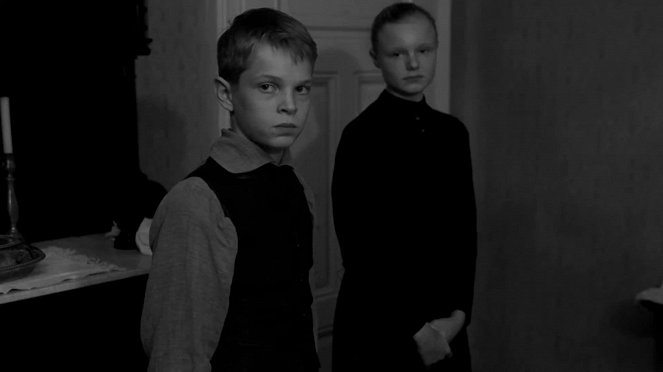Ohjaus:
Michael HanekeKäsikirjoitus:
Michael HanekeKuvaus:
Christian BergerNäyttelijät:
Ulrich Tukur, Susanne Lothar, Rainer Bock, Christian Friedel, Leonard Proxauf, Leonie Benesch, Burghart Klaußner, Steffi Kühnert, Michael Schenk (lisää)Suoratoistopalvelut (1)
Juonikuvaukset(1)
Elokuva Valkoinen nauha (Das weisse Band) kertoo arvoituksellisen tarinan siitä, mitä valta ja voimattomuus saavat aikaan. Valkoinen nauha sai ensiesityksensä toukokuussa 2009 Cannesin elokuvajuhlilla, jossa se voitti festivaalin pääpalkinnon Kultaisen palmun.Ensimmäisen maailmansodan kynnyksellä pienessä saksalaiskylässä eletään ankaran säänneltyä ja hierarkista elämää. Kylän johtohahmot - lääkäri, paroni ja pastori - käyttävät valtaansa muihin asukkaisiin. Pastori sitoo synnin polulle hairahtuneille lapsille valkoisen nauhan käsivarteen muistuttamaan puhtaudesta.
Kylässä alkaa tapahtua outoja asioita. Lääkäri putoaa ansalankaan kompastuneen hevosen selästä, nainen putoaa lahonneiden lankkujen läpi kuolemaan, lapsi löytyy ruoskittuna ja pää alaspäin riipustettuna. Väkivaltaisuudet ja julmuudet vain pahenevat. Vanhemmat pahoinpitelevät lapsiaan ja lapset toisiaan. Kylän oudoista tapahtumista kertoo vuosien jälkeen takaumina kylän opettaja. Niitä vasten voi hänen mukaansa ymmärtää myös myöhempiä tapauksia - tarinan ja sen kertomisen välissä on kaksi maailmansotaa.
(YLE)
Arvostelut (8)
The White Ribbon is the best possible thesis work of a student of all creative subjects at film school. I am one of those viewers who are able to appreciate this (and I have nothing but praise for Michael Haneke’s art), but a long time ago I fell in love with moving pictures above all for their emotions, and those are lacking here.
()
That was awesome! A hard, unpleasant and very intense psychological drama. I’ve just watched it and I feel as if Haneke had ran me over with a steamroller. The White Ribbon is a truly impressive mosaic of relationships in an Austrian village before WWI that reveals the origins of human hatred and corruption. It’s almost like a realistic Twin Peaks.
()
A personalized and surgically accurate analysis of evil in German society before the First World War. Haneke's analytical sadism, which deprives the viewer of a direct view of suffering, creates very unpleasant feelings on the body and soul. In its stylization, the deliberately cumbersome and static film is reminiscent of faded black-and-white photographs, but beneath their cold surface, it reveals a repulsive machinery of humiliation, class jealousy, perversions and injustices. Unfortunately, although The White Ribbon appealed to me intellectually (the film is brilliantly devised and completely rationally composed so that it can speak comprehensively), it missed the mark emotionally (despite the enjoyment from the director's brilliant approach, I remained only a cold observer throughout). It can therefore be assumed that the film will attract mainly fans of Haneke's depersonalized and exploratory view of the dark side of the human soul. For others, it can be either an enticing intellectual plaything, or deadly boredom.
()
The White Ribbon is not so much a dark thriller or even a crime drama as it is a journey into the early 20th century and a precisely executed depiction of the societal thinking and hierarchy of that time. It is a late patriarchal system where the word of the family breadwinner was law and upbringing took place not only in a strict religious but primarily authoritarian conservative spirit. Order, discipline, and authority, where many dark stories took place under the guise of orderliness, and many things were successfully swept under the rug. Masturbation was a crime, but sexual abuse was not addressed. Haneke is an excellent director and it shows in this film. The unsettling atmosphere of the village, far from civilization centers, where the advances of modern technology and modern liberal philosophical movements have not yet reached. I have a problem with some of Haneke's films, with his manipulation of the audience's emotions and unresolved endings, but he succeeded here. The unsettling ending with lots of dark suspicions, hints, and terrifying visions somehow fits into the period of the beginning of World War I and the end of that old quiet patriarchal society. Overall impression: 90%.
()
A humanistic probe into the midst of a group of black-and-white human souls, almost without emotion and without the twist that we would automatically and adamantly demand in the case of conventional narrative scales, but with the most breathtaking and purest visual and acting representation of a filmmaker's vision in many years. A breathtaking clash of angelic innocence and harsh discipline with violent human depravity, where what matters is not the who or the why but the HOW - perhaps the only Haneke film where, if we accept the master's exacting psychological game, we will leave with a warm feeling not only as spectators but above all of pure moral awareness.
()
In a respectable one hundred and forty minutes, Haneke uncovers a truly incredible cabaret of the demeaning, hypocritical, vengeful, and cruel. The most depressing analysis of a closed society you're likely to come across. And the film pulls this off on its own without any judgement. In this work, the door plays a major role.
()
Michael Haneke is an excellent author who can surprise you with each of his films because each of his films is different. It is a different genre, often a different style, although it is true that his films usually have a slower pace. Here, you will be absolutely captivated by the black-and-white execution, even though the film was not originally shot in black and white, but later adjusted to black and white.
()
Set against the backdrop of those horrific events, The White Ribbon reveals the warped morals and stifling atmosphere of a German village, which escalates as the number of atrocities escalates. The spasmodically punctilious and often unnecessarily cruel upbringing of the children blinds the minds of the villagers in their search for the real culprits – unable to even admit or consider that their offspring might have had something to do with it... A very impressive drama indeed, with excellent child actors, in which interpersonal relationships and concealed loathing are excellently portrayed alongside unidentifiable evil (Haneke really takes the gloves off for this one). P.S.: I was pleasantly surprised by the almost full capacity of the multiplex. :) 90%
()

